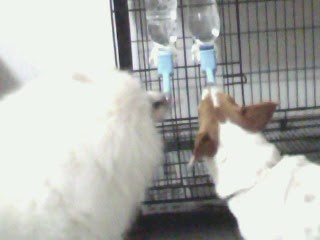
Red flags
You should consider the sort of pet you own. In general, says Dr. Heng from The Joyous Vet, breeds with thick fur coats like Siberian Huskies, Golden Retrievers and Collies shed seriously. This is due in part to humidity-led skin problems like heat stress. That being said, "Short coats like the Jack Russell also shed continuously as their fur growth cycle is short."
The age of your pet also informs the effort that goes into managing your companion's fur. Younger pets are more prone to parasites, which leads to skin problems, excessive scratching and shedding. For older pets, the problem tends to be hormonal as their levels go out of whack. Sterilised pets are more prone to such issues.
If there seems to be excessive shedding, look out, anywhere on your pet, for bald patches, intense itchiness (along with heavy-duty scratching), redness, dried skin scabs, severe inflammation and pus production. If you find any of these, the problem is probably an underlying condition that can only be addressed by your vet.
Stress is sometimes a determining factor in the amount of shedding your pet does. Dogs have to be walked regularly or you might find them ripping chunks of fuzz off themselves in sheer boredom.
Supplementation
A good Essential Fatty Acids (EFAs) supplement is paramount for skin health, particularly Omega 3. While most dry pet foods "claim" to have it in oodles, more often than not, they don't. This is due to Omega 3's extreme sensitivity to light and oxidation. EFAs supplementation applies more to dogs than cats, says Dr. Ly form The Animal Recovery Centre. Stress causes internal inflammation and Omega 3 is an anti-inflammatory oil. "A large percentage of dogs have an inherited inability to neutralize inflammation caused by stress."
Dr. Ly also recommends a good multi-vitamin, and zinc supplementation. Dr. Heng adds that Vitamin C, Flaxseed oil and cod liver oil are good, too, although you'll need to check with your vet for the recommended dosage.
Nutrition
For Dr. Ly, a healthy diet is the panacea to your pet's woes—or in the case of minimal shedding—yours. To minimise this, a mixture of fresh food and commercial food is ideal. He points to the denaturation of protein in high temperature food processing in some kibble brands. "When food is processed at high temperatures, a lot of the essential amino acids are damaged and a lot of nutrients are completely eliminated. And a lot of the nutrients are completely eliminated. And a lot of the micronutrients including enzymes are not found in processed foods even though a lot of them meet the Recommended Daily Allowance (RDA) requirements. But these requirements only meet the minimum daily needs of your pet."
I usually tell people that fresh is good, but raw is even better, says Dr. Ly, who observed that undomesticated animals on a diet of raw prey "look better" than their counterparts in captivity. He also noted that some animals, for example, might be allergic to processed lamb, but when given raw lamb, they do not show signs of allergy.
Grooming
Make sure your pet's groomer is professional enough to recognize skin and coat problems. There are groomers out there who are nothing more than glorified shampoo salesmen. A "professional" groomer, says Dr Ly, would also check with the pet's owner for allergies, past and present. "What I see very often is animals coming in after undergoing grooming, because they break out. They shed even more, they develop skin problems."
The more humid the weather, the more knots there are in your pet's fur, the more knots, the more skin problems, which lead to excessive shedding. Regular brushing of your pet helps. Dr. Heng suggests daily brushing in Singapore's climate. Hiroshi, a groomer with School of Pet Grooming, suggests paying more attention to the neck and back area (where the tail is), because these areas shed more.
Regular grooming might be the single most effective way of keeping fur off your furniture. Use a slicker brush and a shedding comb, go through your dog's hair until it runs smoothly. For dogs with undercoats, consider using an undercoat rake to pull out loose hairs. Use a dematting rake to untangle the matts. Don't be worried if you pull out chunks.
Go to the vets'
Regular visits to the vet would be your final defense and safety net to minimise shedding. We will make sure there are no parasites or underlying skin problems, that the shampoo is correct, and that the diet is adequate, says Dr. Ly. "The skin is a reflection of your internal organs, if your pet's skin is unhealthy, it has internal health problems. What is on the inside will show on the skin first. You should take care of the internal problems first before treating the skin. It's a sign that your pet has internal problems when it has skin and coat problems."
Use low-allergen products
A lot of animals with skin and coat problems find perfumes shampoos intolerable. These often exacerbate the condition, so it is advisable to get a low allergen shampoo. Make sure it is not perfumed and harsh chemicals like Sodium Lauyl Sulfate (the foaming agent that is present in most shampoos) are not present. Dr. Ly doesn't believe in using products for his pets (he has two dogs and a cat) that he would not use on himself. "If I don't believe in the products, how can I use it on my animal companions? 80 to 90 per cent of the supplements, foods, drugs and shampoos I dispense in my practice are fit for human use."
Source: http://www.petsmagazine.com.sg/articles/418-hairballs-getting-a-hold-on-your-pets-shedding

















































 Glitterfy.com - Glitter Graphics
Glitterfy.com - Glitter Graphics